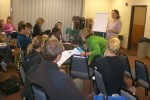Do we as LTER scientists have an obligation to talk about climate change with policymakers, land managers, and other decision makers? If so, what should we talk about, and how should we talk about it?
Recent research into public learning about climate change suggests that dissemination of information about climate science alone is inadequate to make the broader impact we have been charged with. Coupled with insights from philosophy, social science, communication theory, and educational theory, it seems increasingly clear that merely debating or disseminating the facts of the matter may be fruitless and distracting at worse or only an incomplete approach at best. Given the logic by which people reach policy decisions and the underlying motivation behind so-called climate science deniers, it seems wise to begin discussing how to think about climate change communication afresh.
Where does that leave us? How might these cross-disciplinary realizations impact our climate science and the communication of that science? How can we engage with our stakeholders for meaningful discussion and action on climate change? This working group session sought to find answers to some of those questions.
Summary Report
We started the session by asking participants for a one word answer to the question: “What’s one word that you think of when you hear the term ‘climate change communication’?” After ‘taking the temperature of the room’, so to speak, we noticed that participants expressed a fair amount of fear and negative associations with communication on this topic. A short overview of the ‘climate’ of climate change communication and current research on climate change was followed by a discussion on logic, ethics, and values as they relate to discussions and interactions involving climate change. Participants then broke into small groups to discuss one of two scenarios from real climate change communication challenges that occurred at LTER sites:
1. You are asked to give a talk at your town’s environmental club about your LTER site’s climate change research. During your talk, an obstinate member of the public, who is very much a climate change believer with strong environmental leanings, really attacks you for discussing climate change in irrelevant ways. He said that you discuss those things that we, in his words, have no control over but fail to discuss climate change issues in a meaningful way that really helps communities deal with the issue.
2. You are asked to talk to a farmers’ group about LTER research and climate change. During the talk, one farmer stands up and says “We talked about variations in the weather and precipitation. Well, in the time that I’ve been farming, this past growing season and the 2009 growing season were as opposite as I have ever seen in my whole career. How useful are 'adaptation' practices when things are all over the board? How do your long-term trends help me decide how to farm next spring?”
Participants discussed what they would or wouldn’t do or say in response to those questions, and how their respnses might change if they were working with different audience groups.
We ended the working group with a conversation prompted by the question: “As an LTER group, are there important questions or projects we are missing or not doing? What would help us with climate change communication?” Participants identified several possible actions:
- Empower local sites to engage with their local networks
- Provide support for LTER sites to have a liaison with their community
- Have a section on the LTER website that includes frequently asked questions and provide links to other useful information (this would make us not only identify the frequently asked questions but also answer them.)
- Partner and connect to other organizations
- Learn when NOT to give advice/recommendations to decision makers
- When working with non-scientist groups, empower others to participate in the conversation (ask them what they think we need to do, what they observe) and in effect demand that they use the knowledge that THEY have
- Site-specific information is really important; a centralized approach for the LTER network may not work
- Address a local issue that your community is already dealing with…then that can lead into a conversation about climate change and how that will affect the issue
- Take the opportunity to teach about the importance of long-term data, and that without it we wouldn’t know that the climate is changing.
- Link community members with LTER scientists
- Have annual meetings with Extension to link LTER with Extension educators across the network; they are the ones on the ground and will know the issues, communities
- Facilitate advocacy
- Link local knowledge at LTER sites with local communities
- Have public seminars of our science (open house events; maybe even have an annual LTER Network open house, where all sites have an open house on the same day)
- Develop relationships with others in the community; spend time doing this, especially with those we may not associate with
- Critically reflect on ourselves and answer the difficult question: Is our LTER science relevant for climate change solutions? Is there a value to add to our research portfolios to better address this?
By Julie E. Doll (KBS) & Michael P. Nelson (AND)

 Enlarge this image
Enlarge this image